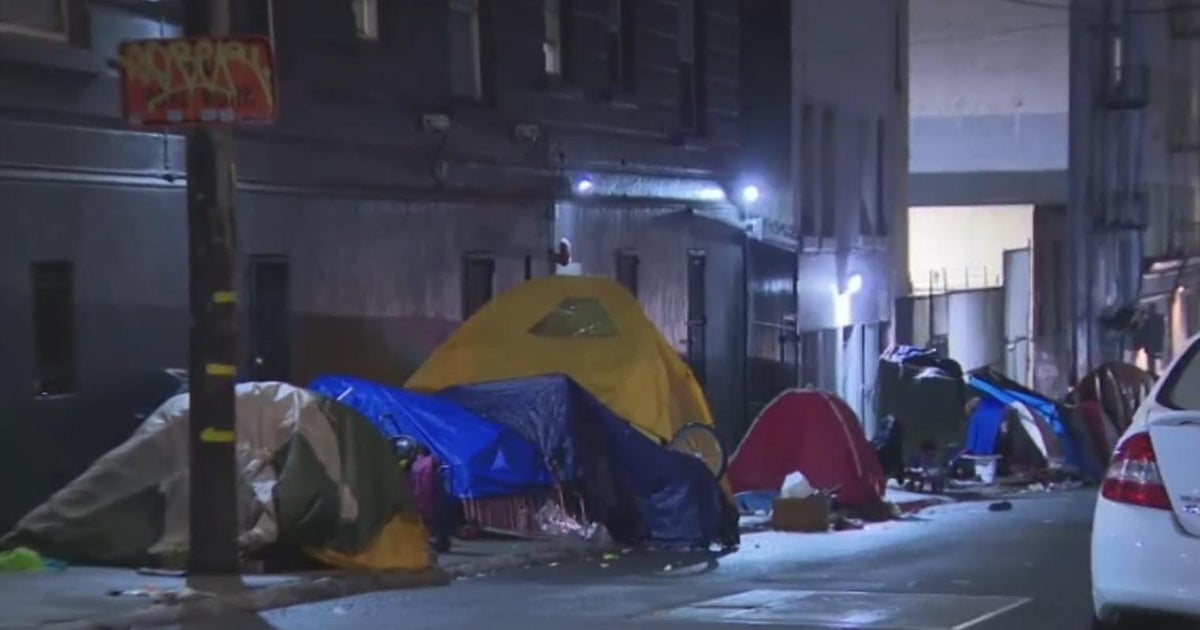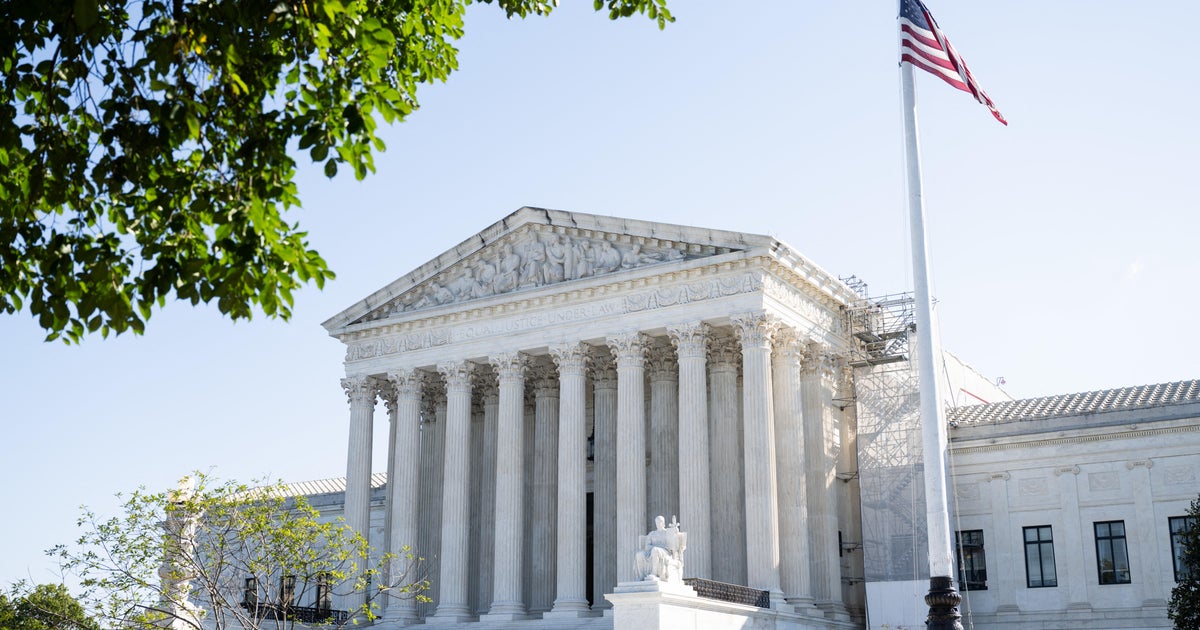CBS News
Supreme Court to decide whether cities can punish homeless residents for sleeping on public property

Washington — The Supreme Court said Friday it will weigh whether a city’s enforcement of rules prohibiting homeless residents from camping on public property violates the Constitution’s protection from cruel and unusual punishment.
The court agreed to take up a case arising from Grants Pass, Oregon, which enacted three ordinances that prohibit sleeping on public sidewalks or streets and camping on streets, parks or other publicly owned property. Violators are subject to civil citations and can be barred from entering a city park for 30 days.
Three homeless residents sued the city in October 2018 on behalf of themselves and “all involuntarily homeless individuals living in Grants Pass.” They sought to block the city from enforcing the ordinances, which they said unconstitutionally punished them for resting, sleeping and seeking shelter from the elements in Grants Pass. A count of homeless individuals conducted by the United Community Action Network in January 2019 found there were 602 homeless people in the city.
The plaintiffs argued that the city had “criminalized their existence in Grants Pass,” as there are no city-run homeless shelters there and only two privately run housing programs, which serve a fraction of the homeless population.
A federal district court ruled against the city, finding in part that the Eighth Amendment prohibits civil enforcement of its ordinances. The court blocked Grants Pass from enforcing its anti-camping ordinances in city parks at night and allowed it to enforce the rules during daytime hours if it provides 24-hours advance warning.
“Because Grants Pass lacks adequate shelter for its homeless population, its practice of punishing people who have no access to shelter for the act of sleeping or resting outside while having a blanket or other bedding to stay warm and dry constitutes cruel and unusual punishment in violation of the Eighth Amendment,” U.S. Magistrate Judge Mark Clarke wrote in a July 2022 decision.
The city appealed to the U.S. Court of Appeals for the 9th Circuit, which upheld the district court’s finding that the Cruel and Unusual Punishments Clause invalidates Grants Pass’ public-camping ordinances.
The divided three-judge panel found that the “City of Grants Pass cannot, consistent with the Eighth Amendment, enforce its anti-camping ordinances against homeless persons for the mere act of sleeping outside with rudimentary protection from the elements, or for sleeping in their car at night, when there is no other place in the city for them to go.”
The full 9th Circuit declined to rehear the case, over the dissents of 13 active judges.
Judge Diarmuid O’Scannlain criticized the ruling and said the 9th Circuit “effectively guarantees a personal federal constitutional ‘right’ for individuals to camp or to sleep on sidewalks and in parks, playgrounds, and other public places in defiance of traditional health, safety, and welfare laws.”
Its jurisprudence in the case, O’Scannlain continued, is at odds with other circuit courts “on a question of exceptional importance —paralyzing local communities from addressing the pressing issue of homelessness, and seizing policymaking authority that our federal system of government leaves to the democratic process.”
The city of Grants Pass appealed the 9th Circuit’s decision in August, arguing that its rulings in cases involving the constitutionality of public-camping rules had “erected a judicial roadblock preventing a comprehensive response to the growth of public encampments in the West.”
“The consequences of inaction are dire for those living both in and near encampments: crime, fires, the reemergence of medieval diseases, environmental harm, and record levels of drug overdoses and deaths on public streets,” lawyers for the city wrote in their request for the Supreme Court to review the 9th Circuit’s ruling.
But lawyers representing the homeless residents argued that Grants Pass’ ordinances render it unlawful to sleep on public property “with so much as a blanket to survive the cold,” and accused the city of trying to force homeless residents into neighboring towns.
“Like a law criminalizing breathing outside by homeless persons, the City’s ordinances punish respondents for simply existing within City limits,” they wrote in a filing urging the Supreme Court not to take up the city’s appeal.
Ed Johnson, who is representing the homeless residents and serves as director of litigation at the Oregon Law Center, said the 9th Circuit’s ruling is consistent with Supreme Court precedent.
“This case is not about a city’s ability to regulate or prohibit encampments. That has always been permissible, is explicitly allowed under the Ninth Circuit’s ruling, and is not at issue here,” he said in a statement. “Nevertheless, some politicians and others are cynically and falsely blaming the judiciary for the homelessness crisis to distract the public and deflect blame for years of failed policies.”
Johnson added that the Constitution “does not allow cities to punish people for having an involuntary status, including the status of being involuntarily homeless.”
The 9th Circuit’s ruling applies to the states within its jurisdiction, including California and Arizona. Top officials from those states, including California Gov. Gavin Newsom, and major cities including Phoenix, San Francisco and Los Angeles, urged the Supreme Court to step in.
“San Francisco uses enforcement of its laws prohibiting camping and sleeping at designated times and in certain (but by no means all) public spaces as a tool to encourage individuals experiencing homelessness to accept services and to help ensure safe and accessible sidewalks and public spaces,” lawyers representing the City and County of San Francisco told the court in a filing. “By restricting San Francisco from enforcing its laws that preserve public spaces for the use of all City residents, the district court has made it more difficult to provide services to persons experiencing homelessness.”
CBS News
Here Comes the Sun: Jack Antonoff and more

Watch CBS News
Be the first to know
Get browser notifications for breaking news, live events, and exclusive reporting.
CBS News
Capturing Moriah Wilson’s Killer – CBS News

Watch CBS News
Be the first to know
Get browser notifications for breaking news, live events, and exclusive reporting.
CBS News
How to watch the Minnesota Vikings vs. Chicago Bears NFL game today: Livestream options, more

Getty Images
The Minnesota Vikings will take on the Chicago Bears today. The Vikings are currently 8-2, an impressive run so far this season, and will be looking to add a fourth win to their current streak after last Sunday’s 23-13 win against the Tennessee Titans. The Bears, on the other hand, are entering this game on the heels of a four-game losing streak after a tough 20-19 loss against the Green Bay Packers last Sunday.
Here’s how and when you can watch the Vikings vs. Bears game today, whether or not you have cable.
How and when to watch the Minnesota Vikings vs. Chicago Bears
The Vikings vs. Bears game will be played on Sunday, November 24, 2024 at 1:00 p.m. ET (11:00 a.m. PT). The game will air on Fox and stream on Fubo and the platforms featured below.
How and when to watch the Minnesota Vikings vs. Chicago Bears game without cable
You can watch this week’s NFL game on Fox via several streaming services. All you need is an internet connection and one of the top options outlined below.
Fubo offers you an easy, user-friendly way to watch NFL games on CBS, Fox, NBC, ABC, ESPN, and NFL Network, plus NCAA football channels. The Pro tier includes 200+ channels and unlimited DVR, while the Elite with Sports Plus tier adds NFL RedZone and 4K resolution. New subscribers get a seven-day free trial and all plans allow streaming on up to 10 screens simultaneously.
You can watch today’s game with a subscription to Sling’s Orange + Blue tier, which includes ESPN, ABC, NBC, and Fox. The plan offers 46 channels with local NFL games, nationally broadcast games and 50 hours of DVR storage. For complete NFL coverage, add Paramount+ to get CBS games, or upgrade with the Sports Extra add-on for additional sports channels like Golf Channel, NBA TV and NFL RedZone.
Watching NFL games, including Fox broadcasts, is simple with Hulu + Live TV, which includes 90 channels, unlimited DVR storage, and access to NFL preseason games, live regular season games and studio shows. The service includes ESPN+ and Disney+ in the subscription.
Want to watch today’s game live on your smartphone? If so, NFL+ streaming service is the solution you’re looking for. It lets you watch NFL Network and out-of-market games on mobile devices, with an upgrade option to NFL+ Premium that includes NFL RedZone for watching up to eight games simultaneously. Note that NFL+ only works on phones and tablets, not TVs.









